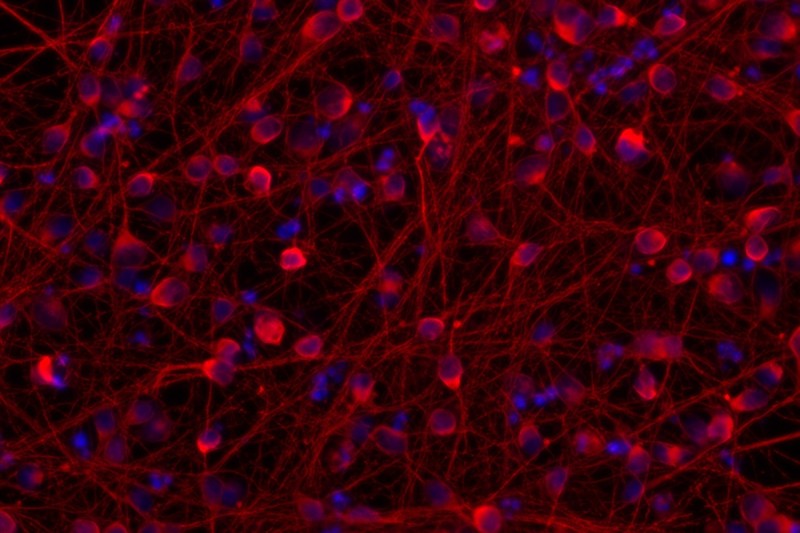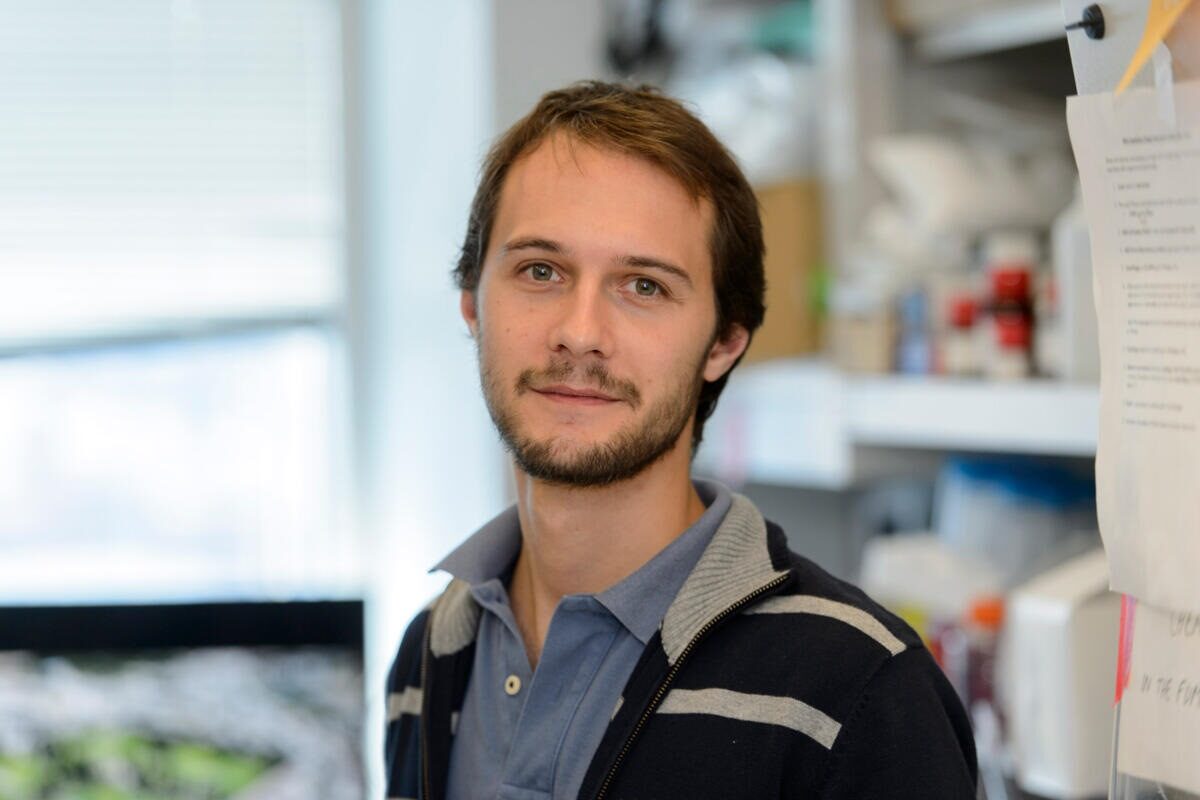
Human pluripotent stem cell-derived neurons. Image courtesy of the Studer Lab.
The neurons that make up our brains and nervous systems mature slowly over many months. And while this may be beneficial from an evolutionary standpoint, the slow pace makes growing cells to study neurodegenerative and neurodevelopmental diseases — like Parkinson’s disease, Alzheimer’s disease, and autism — in the laboratory quite challenging.
Currently, nerve cells derived from human pluripotent stem cells take months to reach an adultlike state in the lab — a timeline that mirrors the slow pace of human brain development. (“Pluripotent stem cells” have the potential to develop into many other kinds of cells.)
New research led by Memorial Sloan Kettering Cancer Center (MSK), however, has uncovered a way to “hack” the cells’ internal clocks to speed up the process. And the work is shedding new light on how cells’ developmental timetables are regulated.
“This slow pace of nerve cell development has been linked to humans’ unique and complex cognitive abilities,” says Lorenz Studer, MD, Director of MSK’s Center for Stem Cell Biology and the senior author of two recent studies published in Nature and Nature Biotechnology. “Previous research has suggested the presence of a ‘clock’ within cells that sets the pace of our neurons’ development, but its biological nature had largely remained unknown — until now.”

Dr. Lorenz Studer
New Insights Into Nerve Cell Development
Researchers, led by study first author Gabriele Ciceri, PhD, identified an epigenetic “barrier” in the stem cells that give rise to neural cells. (“Epigenetic changes” are ones that don’t alter the DNA code.) This barrier acts as a brake on the development process and determines the rate at which the cells mature. By inhibiting the barrier, the scientists were able to speed up the neurons’ development, they reported January 31 in Nature.
(View the related Nature video: Why human brain cells grow so slowly.)

Dr. Gabriele Ciceri
“While studying brain development in mice, I was struck by how neurons progress through a series of steps in a very precise schedule,” says Dr. Ciceri, a senior research scientist in the Studer Lab at MSK’s Sloan Kettering Institute. “But this schedule creates a big practical challenge when working with human neurons — what takes hours and days in the mouse requires weeks and months in human cells.”
Furthermore, the team showed that this rate-setting epigenetic barrier is built into neural stem cells well before they differentiate into different types of neurons. They also found higher levels of the barrier in human neurons compared with mouse neurons, which may help explain differences in the pace of cell maturation in different species.
Uncovering Foundational Biology
That such discoveries were made at a cancer center isn’t as surprising as it might seem at first blush. The Studer Lab has long focused on harnessing advances in stem cell biology to develop new therapies for degenerative diseases and cancer — both of which are strongly associated with aging.
Moreover, MSK has long been a leader in “basic science” research — that is, science that seeks to build fundamental understanding of human biology.
About half of the National Institutes of Health (NIH) budget goes to funding basic science research. And the vast majority of drugs approved by the Food and Drug Administration in recent years involved publicly funded basic research, according to the NIH.
“All of the major advances in cancer treatment in recent years — immune checkpoint inhibitor therapy, CAR T cell therapy, cancer vaccines — they’re all rooted in basic research,” says Joan Massagué, PhD, Director of the Sloan Kettering Institute and MSK’s Chief Scientific Officer. “Sometimes it can take years for the medical relevance of a particular discovery to become clear.”
‘A Valuable Research Tool’
A second study, led by Studer Lab graduate students Emiliano Hergenreder and Andrew Minotti and published January 2 in Nature Biotechnology, identified a combination of four chemicals that together can promote neuronal maturation. Dubbed GENtoniK, the chemical cocktail both represses epigenetic factors that inhibit cell maturation and stimulates factors that promote it.
Along with helping to bring neurons to an adultlike state faster in the lab, the approach holds promise for other cell types, the researchers note.
Not only was GENtoniK shown to speed the maturation of cortical neurons (involved in cognitive functions) and spinal motor neurons (involved in movement), but the chemicals were also able to accelerate the development of several other types of cells derived from stem cells, including melanocytes (pigment cells) and pancreatic beta cells (endocrine cells).
“The generation of human neurons in a dish from stem cells provides a unique inroad into the study of brain health and disease,” the journal editors note in a research briefing that accompanied the study. “A major obstacle in the field arises from the fact that human neurons require many months to mature during development, making it difficult to recapitulate the process in vitro. The authors provide a valuable research tool by developing a simple drug cocktail that speeds up the maturation timeframe.”
The findings could be particularly helpful in modeling disorders like autism that involve problems with synaptic connectivity, Dr. Studer says.
Still, he notes, additional research is needed to develop models of neurodegenerative disorders that don’t occur until very late in life, such as Parkinson’s disease, which has long been a focus of Studer’s research.
“Typically, a person is 60 to 70 years old when the disease begins. No baby gets Parkinson’s,” he says. “So, for those diseases, we need to be able to put the cells not just into an adult state but into an aged-like state. That’s something we’re continuing to work on.”
Additional Authors, Funding, and Disclosures
Both studies include multiple co-authors from MSK and Weill Cornell Medicine. Please see the papers for a complete list.
The Nature study was supported by the Tri-Institutional Stem Cell Initiative (Starr Foundation), the National Institute on Aging (R01AG054720, R01AG056298), the New York State Stem Cell Science (NYSTEM) (DOH01-1239 STEM5-2016-00300, C32559GG), the European Molecular Biology Organization (EMBO), MSK’s core grant from the National Cancer Institute (P30CA008748), a Rohr Family Research Scholar Award, a Monique Weill-Caulier Award, a Swiss National Science Foundation Postdoc Mobility Fellowship (P400PB_180672), and an F32 Ruth L. Kirschstein Postdoctoral fellowship (MH116590).
The Nature Biotechnology study was supported by the Tri-Institutional Stem Cell Initiative (Starr Foundation), the National Institute on Aging (R01AG054720, F31AG067709-01), National Institute of Neurological Disorders and Stroke (R01NS128087), the New York State Stem Cell Science (NYSTEM) (DOH01-STEM5-2016-00300-C32599GG), National Institute of Diabetes and Digestive and Kidney Diseases (R01 DK124463), MSK’s core grant from the National Cancer Institute (P30CA008748), Swiss National Science Foundation Postdoc Mobility Fellowships (P400PB_180672, P500PB_203107), an F32 Ruth L. Kirschstein Postdoctoral Fellowship (MH116590), a Rohr Family Research Scholar Award, an Irma T. Hirschl and Monique Weill-Caulier Award, and an EMBO long-term postdoctoral fellowship (ALTF 311-2015).
Dr. Studer, Dr. Ciceri, and Emiliano Hergenreder are listed as inventors on patent applications filed by MSK related to the research. Dr. Studer is a scientific founder and paid consultant of BlueRock Therapeutics and a scientific co-founder of Dacapo BrainScience.
Read the Articles: “An epigenetic barrier sets the timing of human neuronal maturation,” Nature. DOI: 10.1038/s41586-023-06984-8. (View the related Nature video: Why human brain cells grow so slowly.)
“Combined small-molecule treatment accelerates maturation of human pluripotent stem cell-derived neurons,” Nature Biotechnology. DOI: 10.1038/s41587-023-02031-z